Sports Management Master of Business Administration
Applications Accepted for:
Fall 2026: Oct. 1, 2025 – June 15, 2026
Sports MBA Info Sessions:
- Wednesday, January 14th @ 4:30pm – Sign up link | Zoom link
- Wednesday, January 21st @ 12:00pm (International focus/time zone friendly) – Sign up link | Zoom link
- Monday, January 26th @ 4:30pm – Sign up link | Zoom link
- Monday, February 2nd @ 4:30pm – Sign up link | Zoom link
Created by the Fowler College of Business, SDSU’s Sports Management MBA program is offered fully in person and focused entirely on the international business of sports, featuring top-tier faculty and a dedicated alumni network.
Is getting a Sports Management Degree worthwhile?
A sports management degree gives you hands-on learning opportunities and invaluable networking opportunities in professional sports.
- Overview
- How To Apply
- FAQ
About the Program
SDSU’s Sports Management MBA degree program is an accelerated 18-month degree intended for highly motivated students seeking an intensive academic environment combined with extensive hands-on industry experience.
Specialized Curriculum
Be immersed in the world of sports marketing, management, finance, and analytics through our accelerated 12-month curriculum focused on the dynamic business of international sports, and an additional 4 months of supervised consultancies worldwide.
Industry Connections
Tap into strong industry connections with leading sports organizations, providing unparalleled opportunities for internships and job placement. Build valuable relationships within the vibrant sports landscape of Southern California, laying a solid foundation for a successful career in the industry.
Hands-On Learning
Benefit from “experiential learning” with a curriculum centered around real-world applications. Engage in consulting projects, participate in an international case study trip to the Dominican Republic and embark on an immersive 4-month internship at a sports organization in your final semester.
Career Outcomes
Program graduates can enter the exciting world of sports management in the following areas:
- General Manager
- Athletic Director
- Sports Operations
- Player Personnel
- Sports Marketing
- Brand Partnerships
- Public Relations
- Sports Agent
- Sports Business Analyst
- And More!
Courses
In this course, students look at issues facing sports organizations through a statistical lens; for example, how to predict concession stand wait times at sporting events or how to evaluate or even predict athlete performance. This course offers hands-on training in Microsoft Excel, SPSS and more to provide students with the foundational tools for thinking critically about current issues in the sports industry.
Organizational Behavior and Leadership challenges the Sports MBA cohort to think critically about all aspects of interpersonal communication and organization within the workplace, and how varying approaches can affect performance and cohesion at work. The class also focuses on how workers can pursue meaningful and high-achieving work while managing boundaries, promoting wellness, and avoiding burnout for themselves and those they work with.
In this course, students learn the accounting language with the expectation that when they finish the courses, they’re capable of making sound financial decisions in management roles. The ex-CFO of the San Diego Padres serves as an annual guest speaker for the class and class projects include financial statement analysis of sports industry sectors of the students’ choosing.
Financial Management exposes students to the fundamental principles of corporate finance. This course discusses how managers use financial statements, engage in financial planning, value cash flows, understand risk, make long-term investment decisions, and how to make both long- and short-term financing decisions. Once the groundwork has been laid, students apply these principles to analyze sports business topics such as franchise valuation, stadium financing, personal seat licenses, athlete salaries, and more.
The Sports Marketing course provides an in-depth introduction to the principles of marketing, and how they apply within the sports business realm. To teach sports marketing effectively, Dr. Dalakas focuses heavily on corporate partnerships and sponsorship in the world of sports, and specializes in fan behavior and the fan experience using real-world examples throughout, including an annual corporate partnerships consulting project with a sports organization.
Sports Economics uses the sports industry to illustrate the applications of microeconomic principles, macroeconomic concepts, and analytical tools used in business decision-making. Students learn to apply industrial organization theory to analyze sports business models, and related issues when evaluating local markets for teams, and calculating the value of sports franchises. Course discussion topics include stadium financing, ticket pricing, team relocation, player salaries, athlete representation, and arena naming rights deals.
Throughout this course, students study the topics related to the design, execution and management of operations and supply chain systems. The course teaches students to model solutions related to project scheduling and management, inventory management, demand forecasting, and queue management. Group presentations for this course provide students the opportunity to research how sports business organizations manage issues related to their operations and supply chains.
Strategic Thinking examines the theories and trends that shape the evolving relationships between sports organizations and their fans. With examples drawn from all segments of sports business, this course is intended to give students a foundation of business principles that can be applied to the sports industry.
In this course, students build and refine their personal playbook as part of broader strategic career planning. Students learn negotiation skills, resume building, interviewing tactics, participate in corporate culture workshops and more in order to build their personal brands and enhance employability and longevity in their careers. Using a combination of Professor Lindner’s expertise and network, as well as many guest speakers, students continually focus on and develop professional and personal plans and goals.
This course is a summary of marketing as a business function and field of study that is critical to the success of an organization. To achieve this objective, students enroll in this series of instructor-led marketing lectures, paired with subsequent site visits for experiential learning. The final marketing plan project will include proof that students have understood the learning objectives of strategic thinking, planning, creative elements of promotional campaigns, and data driven measurements of growth as it relates to the broad field of Marketing.
The goal of this course is to help students gain a greater understanding of business ethics, particularly as it relates to shaping a diversity, equity, and inclusion agenda for themselves and the organizations for which they work. The course takes students through a variety of perspectives on power structures, disparities and promising practices that create a more equitable and just society. Topics covered in the course include: cultural agility, inclusive leadership, corporate social responsibility, community engagement, and diversity communications in sports.
The goal of the Sports Law course is to help students create a process for thinking critically about legal issues through the use of legal analysis techniques. The course achieves this through covering business law subject matter using multiple perspectives so when legal issues arise they are aware of the relevant stakeholders. This course is heavy on current events in sports, and helps students develop a practical understanding of topics such as: the U.S. legal system, the international sports legal system, the law of torts and intellectual property, athlete representation, contracts, employment, and collective bargaining.
This course introduces marketing analytics that are applicable in business broadly, as well as digital marketing specifically.
In addition to examining these environments, this course will provide a brief introduction to the necessary technical skills for marketers to participate in, produce content for, and analyze consumer behavior in digital networked environments. The primary objective of this course is to enhance participants’ ability to engage in marketing planning and implementation in networked environments. Specific marketing activities such as pricing, product development, distribution, promotion, and campaign effectiveness measurement will be considered.
In the Business Analytics course, students develop a fundamental understanding of analytical techniques as well as analytics software to tackle real-world sports business issues. At the completion of this course the student will have a working knowledge of how sports organizations employ CRM for lead management, visualize data using platforms such as Tableau, and use statistical techniques to solve problems for departments such as marketing, ticketing, and corporate partnerships.
This course features an international excursion to the Dominican Republic. Since 2009, Sports MBA students have studied abroad in the D.R. for part of their summer semester to observe and evaluate the impact that Major League Baseball and its teams have on the country. Students learn from top MLB officials in the country, tour team facilities, meet with prospects, work with NGOs, and conduct community service, all while immersed in a Spanish-speaking environment and vibrant island culture.
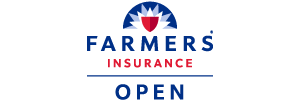
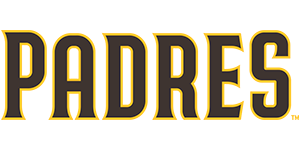
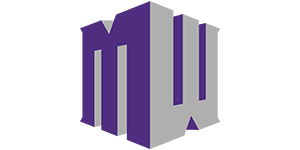
- PGA TOUR Executive Women’s Day at the Farmers Insurance Open
- Farmers Insurance Open
- US Women’s National Team vs. Republic of Ireland
- US Men’s National Team vs. Canada – International Friendly
- NCAA Sweet 16 Western Regional in Anaheim
- Mountain West Conference Tournament
- Women in Sports and Events (WISE) Power Play Event

- IRONMAN SuperSEAL Olympic Triathlon
- FootGolf San Diego Tournaments
- USA Rugby Tournaments
- MLB Spring Training – San Diego Padres
- Rock ‘n’ Roll Marathon – Carlsbad 5000, San Diego 5K Run
- Special Olympics South Bay Area Games
- AVP Beach Volleyball – Huntington Beach Open
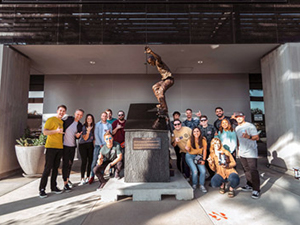
- Red Bull Wings for Life World Run
- Mexico vs. Chile International Friendly
- Sports Business Journal Intersport Brand Engagement Summit
- Fox Sports San Diego – MLB All-Star FanFest Activation
- Under Armour – MLB All-Star FanFest Activation
- Stand Up to Cancer – MLB All-Star Game Activation
- Dew Tour – Long Beach
- Self Shape Surf Festival
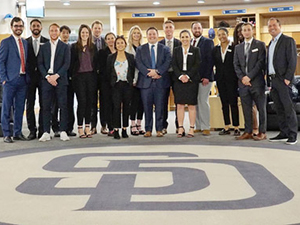
Our students learn to apply the business principles they learn in the classroom and hone their presentation skills with real clients in the sports industry through consulting projects including developing marketing plans, organizational analysis reports, and pitching new ideas for corporate sponsorship. Previous clients have included:
- Pittsburgh Penguins
- Oakland A’s
- US Olympic Training Center
- SDSU Athletics
- Victus Advisors
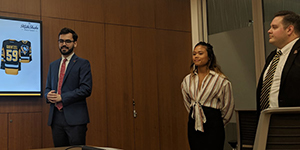
- Navigate Research
- TGR Live
- Challenged Athletes Foundation
- Nixon
- Anaheim Ducks
- Farmers Insurance Open

- FlingGolf
- Topgolf Callaway
- UCSD Athletics
- T-Mobile
- San Diego Gulls
- Draftkings
- San Diego Wave FC
- Super Girl Surf Pro
- Golden State Warriors
- Club Tijuana
Dominican Republic Trip
Every year since 2009, Sports MBA students have spent approximately ten days as a group on site in the Dominican Republic. This trip is one of the most memorable experiences of the year for Sports MBA students. The excursion is tied to an academic course in Management and is led by program director, Scott Minto (SMBA ’06). The concept of the trip is to develop students’ global competencies through a complete cultural and language immersion in a developing country. The class prepares extensively for the trip, reading books about Dominican baseball and culture and studying Spanish.
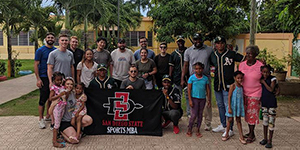
After completing the 12-month classroom portion of the Sports MBA curriculum, students are prepared to work with a sports organization on a full-time basis. The MBA candidates have a faculty mentor oversee their work during their final semester, with the goal of providing their host organization with a comprehensive consulting report on a specific sports business field at the end of the term. The course work is completed remotely and classes do not meet on campus during this term. Many students secure full-time employment during this portion of the program, and while many students land opportunies in Southern California, a number of students each year move elsewhere to complete their degree.
- BA 780 Field Studies in Business: 4 Month Internship
- BA 795 Integrative Business Analysis: Final MBA Thesis Report
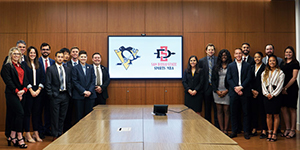
Learn more at a free and informational webinar:
https://sdsu.formstack.com/forms/request_info
For more information, please visit the Fowler College of Business website at business.sdsu.edu/grad/sports-mba.
You can also email smbainfo@sdsu.edu or call (619)-594-6023 during business hours (Monday-Friday, 8 a.m.-4:30 p.m. PT) for more information.
Classes run from the end of August to the end of July the following year. Students will then start their on-site work with a sports organization in August, and write their thesis simultaneously, until December. Graduation will be at the end of December or start of January depending on the year.
Applications open October 1st and close June 15th.
No, we do not currently require the GMAT or GRE.
Yes, this program is eligible for federal and private student loans and other forms of financial aid. The rules around some financial aid options for graduate students are changing significantly, starting July 1, 2026. For more details and further guidance on the new rules, visit the Announcements section of the SDSU Financial Aid website.
Yes, all of our classes are in person.